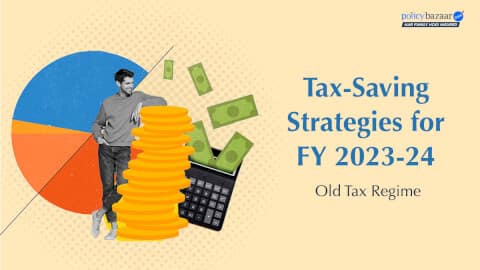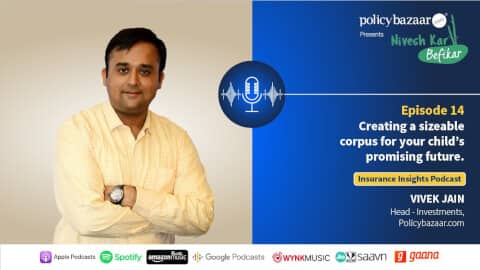1
Feeling Inadequately Insured? 3 Ways To Extend Your Health Insurance CoverDecoding Insurance
NiveshKarBefikar With Vivek Jain: NRI Special Session On Investment
As Covid crisis continues to wreak the economy, businesses are adapting themselves to survive. Individuals are making conscious buying decisions especially when it comes to investment keeping the volatility of markets in mind vis a vis getting good returns.
Policybazaar has a plethora of options for the customers like Child savings plans and Capital Guarantee Solutions which offer higher returns for your long term goals and are also a safe investment option during these uncertain times. In continuation of its consumer awareness initiatives, Policybazaar organized an investment-special webinar, under its Nivesh Kar Befikar series for its Gulf NRI audience. The webinar was hosted by Vivek Law, Founder, and Editor-in-Chief of The MoneyMile, who spoke to Vivek Jain, Head, Investments business, Policybazaar. Here are the edited excerpts from the Q&A session:
Q. What is the maximum amount you said for child education, irrespective of whatever he or whichever plan he or she chooses?
—From Hemant Chawla
There is no upper limit on the amount that you can pay for your child's education. Graduation in India would cost Rs 20-25 lacs and it will cost anywhere between Rs 50 lacs- Rs 1 crore abroad. If your child is 2-3 years old, you have 15 years before he or she goes to college. You should back-calculate the investment amount from when the child is 18 years old. These kinds of calculators are available on our website.
Q. We'll be investing in INR after converting from USD or other currencies. INR depreciates about 50 percent every year. Virtually, the returns are negative. So how do you propose we handle this aspect?
—From Shiv Arora
I think the risk of currency rate exchange will be something that I don't disagree with. But there are two aspects to this. One, I think people who want to come back to India, if they will be using the money in INR, then this risk of INR depreciating won’t be there. Also, if you invest in a developed economy say, Gulf countries or in the US or Europe, the interest rates and the return is even lower. Whereas if you look at the Sensex in India, over the last 10 years, it has given 15-16% returns. Even if we even say that now Indian markets won’t give 15-16% returns, I think in the next 10 to 20 years, they will give at least 10 to 12% returns. As compared to a developed economy, I think these kinds of returns will be difficult. But I still agree that this rupee depreciation risk will be there in the investment.
Q. What are the benefits of a capital guaranteed plan?
This is something that came from feedback from our customers, December, January when Covid-19 had just started. People were scared about losing their capital invested. So, we came up with a solution wherein the invested amount is basically safe. Suppose you pay Rs 20,000 per month, we split that money into two plans.
One of them is a guaranteed return plan which will ensure that no matter what happens to the market, you will get back your invested amount at the time of the majority. The rest of that amount gets invested in the market. If the market goes up, you get the benefit of the market upside as well. So this is the benefit of having a capital guarantee solution wherein you can stay invested in the equity market without any fear that you will get negative returns. If you look at our business mix now, almost 50% of our business has actually moved to Capital Guarantee.
((relatedarticle_1))
Q. I'm 54 and still have 6 more years to retire. I do not have a pensionable job. How to invest and where to begin so that I get some amount per month?
If you are already 54 and you have a corpus to invest, I think you should look at annuity plans because, in those plans, your pension amount will get guaranteed to date, say for the next 30 years or 40 years, you will get that pension amount as fixed income every month. You also have an option of joint annuity wherein you get a monthly pension for a lifetime and when the policyholder dies, the spouse gets a monthly pension till he or she is alive, and then the money gets paid back to the nominee. So basically you have a pension as well as you are leaving a legacy behind.
Q. Can you please summarize the pension plans?
—From Piyush Goel
There are two types of pension plans. One is the annuity that I mentioned earlier. The other one is a SIP, which is a monthly investment, say for the next 10-15 years, whatever premium paying term you choose. The flexibility that you have in the plan is that after five years, you can make partial or complete withdrawals. In these plans, you can start a monthly pension at the retirement age which can go on till your lifetime. The good part is there is no reinvestment risk because you can move the corpus to a debt fund which will give you 7-8% returns.
Q. Do we have a mediclaim for NRI which we can use in India?
—From Ritesh Andharia
Currently, we don't have any mediclaim options for NRIs. We have health insurance options that you can buy for your family back home.
Q. Can we get some additional advantages in child education plans as compared to the rest of the plans?
—From Ashwani Kumar Sharma
Child education ULIP plans have a very unique triple benefit. One is that if something happens to the parent, the policy continues and future premiums are actually paid by the insurance company. So the child's future is secured even in the parent's absence. The nominee which can be the child or the spouse, gets the sum assured in case of any mishappening. You also get a monthly income to cover your expenses.
Q. Any term life insurance plans for NRIs?
—From Hemant Patil
We have all a lot of term life insurance plans for NRIs as well, but the sum assured may be limited because of the current Covid-19 situation. But there are a couple of companies that are still offering term insurance for NRIs.
Q. Which is the best pension plan that you will recommend?
—From Dinesh Unathil
We will refrain from recommending any plan on this webinar, but we will definitely get in touch with you one on one.
Q. Please tell us more about the investment solutions offered on Policybazaar’s platform.
—From Anuroop
If I have to broadly categorize the investment options that we have, we have goal-based saving plans, for child education or for retirement. We also have a monthly savings plan like a capital guarantee solution wherein your premium is secured and you also get the market upside. For certain kinds of consumers who are looking for 100% guaranteed plans, we also have guaranteed plans wherein, the insurance company upfront gives you on paper about the return you will get. So we have the whole gamut of plans right from 100% market linked ULIP plans to 100% guaranteed non-participating plans.
Q. I would like to understand more about guaranteed return plans.
—From Siddharth Singh
Guaranteed return plans are non-participating plans wherein you can basically get guaranteed returns for as long as 25 years. These plans typically give you 5-6% returns. They also give you a guarantee for more than 20 to 50 years, which is very unique because even in Fixed Deposit, the maximum guarantee that you can get is for 10 years. Since this is an insurance plan, it qualifies for benefit under section 10 (10D) wherein the returns will be tax-free in case you come back to India, unlike an FD which is taxable.
Q. If these are zero commission plans, how do you make money?
—From Abdullah Abdulgafoor
When we are distributing online as compared to an agent who is distributing offline, the costs are very different. We are able to serve more customers with one agent. That is why our costs are much lower than other channels. We get paid from the part of the money that the insurance company makes.
Q. If FD can give 7-8% returns annually, 5-6% returns on guaranteed plans are very low comparatively.
—From Sinoj Pullolickal
Actually, returns on FDs have fallen during Covid. In the last eight months, RBI has cut the repo rate about 250 basis points. FD rates are going as low as 5.4%. For NRIs, this may be higher, close to 6-6.5% but that will be taxable. Whereas in Guaranteed plans, insurance products will be tax-free. The other benefit is you also get a life cover which is 120 times of your monthly premium or 10 times of your annual premium.
Q. If you don’t take any commission from customers, you should be getting from the providers. The concern is that you would be recommending the provider who pays you the most. Please clarify.
—From Abdullah Abdulgafoor
We have tie-ups with almost all insurance companies. There isn’t much difference between commission paid between our partners. We will never be unbiased with the customer and building trust with them is of utmost importance to us.
Q. I have a child and I'm looking to invest. I am looking for some plans for future security. Please suggest some of the best options.
We have child plans from about 10 insurance companies. The best performing plans are Bajaj Allianz and HDFC Life, followed by Edelweiss Tokio and Max Life on the basis of the highest returns basis past performance.
Q. How easier is it to get a claim from Policybazaar instead of the company directly?
—From Siddharth Singh
Once you are buying from Policybazaar, apart from the insurance company, we will also be assisting you in the claims process.
Q. I am new to investment and don’t know much about it. What is the best investment plan that I should start with?
—From Srihari
If you're starting your investment, maybe going ahead with a capital guarantee solution will be a good option. Returns are in the range of 9-11% basis 7 years past performance.
Q. What are the safe investment options for a retired person?
—From Joseph
Buying an annuity plan wherein a guaranteed pension amount for lifelong is fixed will be a good option.
((relatedarticle_2))
Q. What is the benefit of buying from Policybazaar and not the company directly?
—From Urmesh Chandra
Some plans like Capital Guarantee Solutions have been built with our partners and are only available exclusively on Policybazaar. You won’t find these plans elsewhere.
Another benefit of buying online is that we have a host of options and you can decide which plans suit the best as compared to an insurer which might give a biased opinion.
Q. What are the investment options with no long term commitment (no lock-in period), one-time investment, and any time exit option?
—From Jaber Syed
Unfortunately, because these are ULIP plans, we have a single pay option wherein you can invest one time. But the minimum period of investment is five years. I would recommend that if you're looking for good options, investing for a longer period of time, 5-7 years will be a better option, because if you're looking to exit in one or two years, it may be risky. You never know that maybe after two years, the market may not be in good shape. What if we have another similar situation like Covid? I think short term investment options are always risky.
Q. What is the turnaround time in issuing a policy in comparison to buying it directly?
—From Ashwani Kumar Sharma
If all the documentation is complete depending on the age of the customer, if there is a telemedical requirement and it is done, within 48 hours, the policy will get decided. So, this is the benefit of buying online.
((newsletter))














